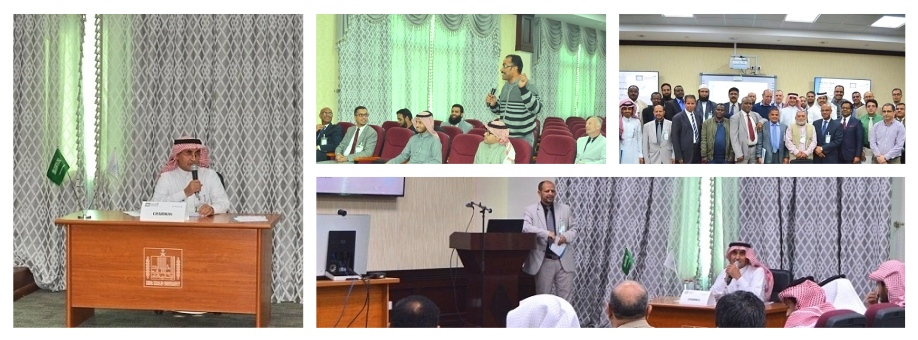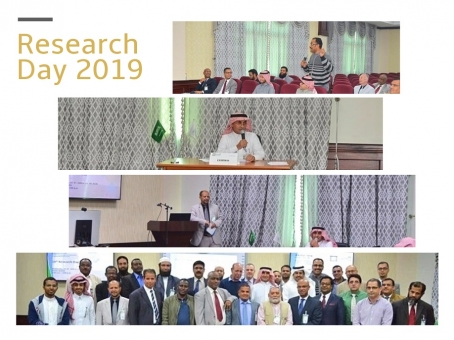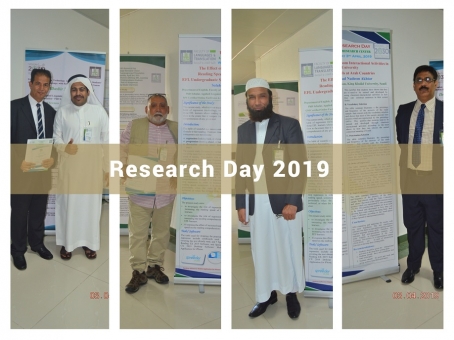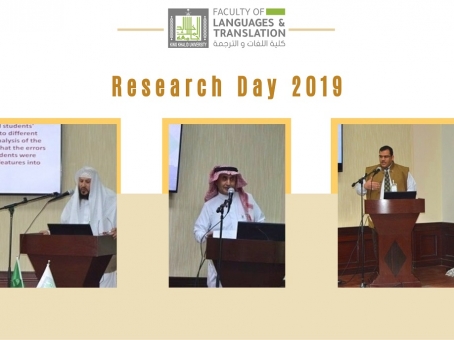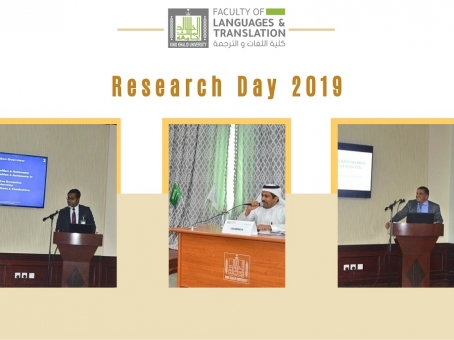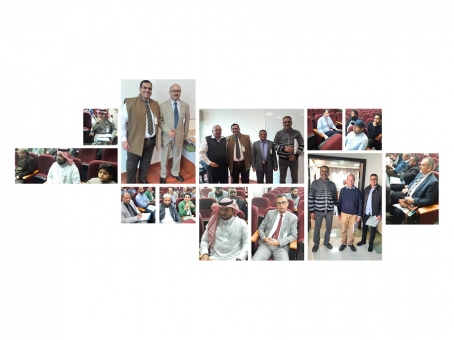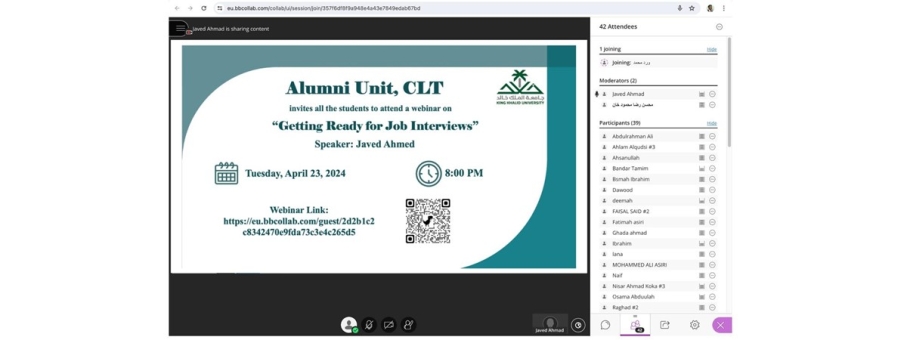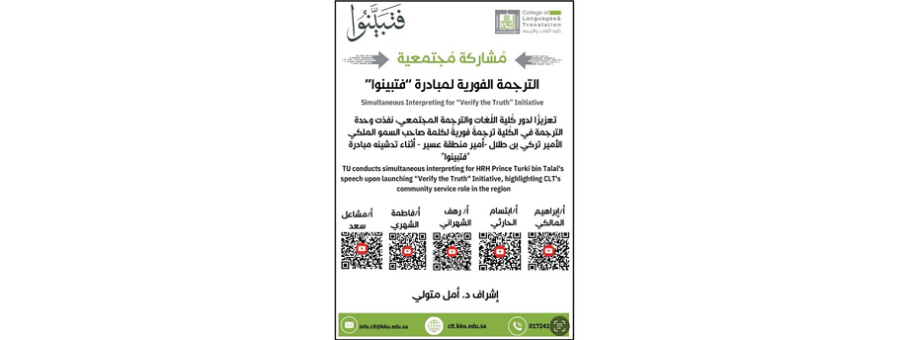The 14th Research Day, under the supervision of Dr. Ismail Al-Refaai, Director of the Language Research Center, was held on April 03, 2019 at King Khalid University. The program began with a recitation of the Holy Qur'an and a welcome speech by Dr. Abdullah Al-Melhi, Dean of the Faculty of Languages and Translation. In his remarks, he encouraged faculty members as well as the graduate students to take part in such an event and at the same time emphasized its importance. He highly appreciated the faculty members and especially the students who made substantial contributions to the event. He also suggested the researchers be more interested in topics having practical importance that would cater to our current teaching and learning situation. He conveyed his heartfelt thanks to the organizing committee who had worked day and night behind the scenes.
The first speaker of the first session was Dr. Abdul Wahed Al-Zumor whose presentation was titled “Stance-taking Strategies in Advanced L2 Students' Critique Writing: A Corpus Based Study”. His study explored stance-taking strategies as employed by MA Applied Linguistics students when they write a critique. Dr. Karem Abdullateef spoke on the subject of “The Effect of Training College Freshmen on Direct Negotiation Strategies on Improving Their Acquisition and Use of These Strategies and Foreign Language Anxiety”. He emphasized the improvement of students' post-performance in meaningful negotiation strategies. Dr. Hala Mohamed Osman Salih and Dr. Mazeegha Ahmed Al-Tale presented on “Saudi Female EFL Learners' Cognitive Styles and Reading Comprehension: Implications for Reading Instruction”. The paper focused on the cognitive styles of Saudi female EFL learners and their relationship to academic performance in reading comprehension. Tanzin Ara Ashraf spoke about “Strategies and Enhancing Saudi EFL Learners' Oral Fluency by TBLT (Task-Based Language Teaching) Approach”. Her presentation emphasized the application of the TBLT approach in order to enhance EFL learners' fluency in speaking.
The second session started with Dr. Ahmad Al-Faifi's paper titled "Why Does the End-Product of Students' Translations Not Match the Input (ST)?”. He concluded that many of the students' translation errors could be avoided if they made optimal use of the Arabic courses provided by the university, as well as the English ones. Dr. Adel Bahameed delivered a presentation titled “Nine Practical Formulas for Translating Proverbs” that aimed at showing the translation equivalences used and present justifications for the preferred equivalences and developing a comprehensive strategy or a model for translating proverbial expressions. Dr. Eyhab Abdulrazak Bader Eddin spoke about “Fleeting Glimpses into the Semantic Peculiarity of Translating Nouns in the Glorious Quran”. His paper concluded that the seemingly noun synonyms in the Quran are not so, resulting in a lexical asymmetry in translation. Rahaf Khalid Asiri and Ameena Awad Algarni talked about “Translation from English into Arabic from Linguistics' Perspective”. They highlighted the interrelation between linguistics (syntax and semantics) and translation, and how this relationship affects the process of translation from English into Arabic. Dr. Najat Ahmed Busabaa and Dr. Zahra Ahmed Misfer talked about “Stress Placement and the Difficulties Encountered by EFL Female Students at Faculty of Languages & Translation, KKU”. They highlighted the reasons for the inability to apply the rules of stress placement properly and practically by the EFL Female students at the Faculty of Languages & Translation. Shanjida Halim, Dr. Rizwana Wahid, Tanzina Halim, and Dr. Oveesa Farooq spoke about “Why Don't Learners Learn What Teachers Teach?”. They emphasized the fact that both teachers and learners need to go to the language classroom with well-determined plans or intentions. The last speaker of the session, Mohammad Adil, presented his paper titled “Practical Application of Learners' L1 to Teaching Meaning in EFL Classes”. He revealed that learners' first language plays a significant role in helping them with the clarification of meaning in a more straight-forward way provided the teacher simultaneously uses strategies to reduce L1's negative impact on the learning process.
The first presentation of the third session was delivered by AmatulHaffez AbdulRaheem Alvi. Her paper was titled “Multimodal Interactive Teaching Methodologies as Effective Tools in Literature Courses in EFL Classrooms”. She emphasized that there is a dire need of implementing multimodal and interactive teaching methodologies that reconcile traditional teacher-centered methodologies (LM, CM, PGM, SG, etc.). Md. Mahmudul Haque spoke on the subject of “Cognition, Metacognition and Autonomy: Understanding the EFL Learner's Cognitive Process”. He explored the connection among cognition, metacognition and learner autonomy, examined the EFL learners' cognitive process, and provided suggestions for checking the possibility to conduct empirical studies in order to identify the ways by which cognition, metacognition, and learner autonomy are connected. Dr. Shadma Iffat Rahmatullah talked about “Female Undergraduates' Inclination Towards Studying English Literature for Learning English Language”. Her study examined whether the students are inclined towards or are reluctant to study English literature for the purpose of critical study or language enhancement. The factors which lead to students' tendencies to avoid opting to choose literature for further studies were analyzed and presented. Ayman Hassan Hammady Zoli talked about “Mutual Intelligibility between Bani Malek and Al-Rayth Dialects”. The degree of mutual intelligibility between 'Malekis' and 'Al-Raythis' and the factors causing this phenomenon was highlighted. Dr. Eman Mahmoud Ibrahim Alian delivered a presentation titled “The Effect of Some Reflective Thinking Strategies Based Program on Developing Literary Reading Skills and Metacognitive Reading Awareness of the EFL Student Teachers”. Her paper examined the effect of reflective thinking strategy based programs on developing literary reading skills and metacognitive reading awareness of the EFL student teachers. Eman Alzaanin presented her paper titled “Theorizing Language Teacher Cognition: A Constructivist Grounded Theory Analysis”. She highlighted the flexibility of procedures in grounded theory to build a theory that effectively captures language teachers' cognition, explains their pedagogical practices, and depicts how language teachers perceive and react to their ecological contexts where they operate. At the conclusion of this session, Dr. Hasan Mohammed Jaashan presented his paper titled “Decoding Sense in Caricatures: A Study in Semio-Stylistics”. He showed that the relationship between sign and object in all caricatures results in one of the three ways (interpretants) and concluded that caricatures are mere connections between signs and objects. He explained that this results in formulating specific perceptions about the highlighted phenomena.
Besides the oral presentations, the following posters were displayed as well.
- “Paperless Assessments and Lectures in EFL classes at FLT Female Campus: Teacher's Perspective”, Aisha Alvi;
- “Interrogatives in Classical Arabic as Represented in the Quran”, Alaa Al-Qarni, Ashwaq Al-Qahtani, and Maryam Shami;
- “Inductive versus Deductive Approaches of Grammar Teaching and Learning: A Case Study on Teaching Grammar to Diploma Students at King Khalid University”, Amal Abdelsattar Metwally;
- “The Translation of Four Types of the Particle Lam (Casualلام التعليل, Imperativeلام الأمر, Denial Lamلام الجحود, لام جواب لو in the Holy Quran into English”, Asma'a H. Albin Hassan, Saja Alahmari, Hajar Asiri, Ohood Al-Qahtani;
- “The Epistemological Aspects of Discourse Analysis Toolkit in Analyzing Business Texts”, Ayman Hamad Elneil;
- “Investigating the Role of Medical Terms Translation in Facilitating Learning Process for Medical Students”, Dr. Abdulrahman Elyas;
- “Utilization of Video Technology to Promote Saudi EFL Students' Authentic English Language: With Reference to Unlock Level 1 Course”, Dr. Ali Albashir Alhaj;
- “The Impact of LEP Activities on Speaking Skills: A Case Study on EFL Students at King Khalid University”, Dr. Dawood Ahmed Mahdi;
- “Hegemony of English and Englishes from Linguistic Imperialism and American Perspective”, Dr. Elsadigh Ali Elsadigh Elnadeef;
- “Demotivating Factors Affecting EFL Learning of Saudi Undergraduate Students”, Dr. Fadi Maher Al-Khasawneh;
- “Investigating the Role of Comprehensive Reading in Understanding the Contextual Meaning of a Written Discourse", Dr. Hasan Mahill Abdallah Hasan;
- “Exploring EFL Graduate Students' Attitudes Towards and the Use of Mobile Phones in Language Learning”, Dr. Ismail Al-Refaai;
- “Implementing the Eclectic Method to Teach English to Science Undergraduates in KKU”, Dr. Najmus Sharifa;
- “The Role of Motivation in Second Language Learning at King Khalid University”, Dr. Rafiq Ali Al-Shameri and Mohammad Al-Fuad;
- 'Ideological Conflicts in Tahmima Anam's 'The Good Muslim', Dr. Safia Asad;
- “Summary Writing Strategies Used by EFL Learners”, Dr. Wafa Ismail Saud;
- “Experience and Mystery of the Marabar Caves in A Passage to India”, Irin Sultana;
- “Attitudes and Perceptions of Applied Linguistics and Translation Female Students Towards Using Virtual Classes in the Master Program at King Khalid University”, Messadah Shaye Al-Qahtani;
- “Pedagogy: Learning Enhancement with Technology”, Nusra Mehtab and Sufia Sultana;
- “Investigating the Role of Classroom Interactional Activities in Developing University Students' Writing Skills at Arab Countries”, Rana Muhammad Nadim Akter;
- “The Impact of the Linguistic Hegemony of English on Saudi EFL Learners Identity: English Department-Female-at King Khalid University”, Rawiah Ali Al-Shehri;
- “Investigating Saudi Female Students' Speaking Problems and Solving Strategies in Asir Region”, Roa'a Abdullah Hussein, Khadijah Hezam Al-Shehri, Manal Mohammad Abdulhadi, and Nidaa Abdullah Albakri;
- “Linguistic Analysis of the Print Media Advertisements”, Saba Sarwar;
- “The Effect of Stopping Regression on Reading Speed and Comprehension of EFL Undergraduate Students of King Khalid University”, Salahud Din Abdul Rab;
- “The Impact of Using E-Learning Technologies as a Tool in EFL Learning/Teaching in the Department of English at King Khalid University: An Empirical Research on Its Effectiveness”, Samar Al-Almner;
- “The Impact of Age on Second Language Learner Fluency Critical Period of Speaking Second Language Fluently: A Case Study of FVIS Students”, Sara Ahmed Abdullah Alasiri;
- “Learning Goals and Teachers' Roles”, Sharmin Siddiqui;
- “An Interactive Tool to Promote Effective Learning for EFL Learners”, Sufia Sultana, Nusra Mehtab, and Richa Rastogi.
The Language Research Center is committed to enhancing and expanding scientific research efforts throughout the university system. Advanced research is a vital element of the national development strategy and a primary objective under Vision 2030. The Faculty of Languages and Translation is continually increasing its research efforts to contribute towards the achievement of these goals. It goes without saying, the 14th Research Day was a great success and it gave the participants an opportunity to discuss and share their thoughts.
Date: 4/5/2019
Source: Mohammad Adil Siddique
Multimedia Source: Mohammad Taisir Albokai

